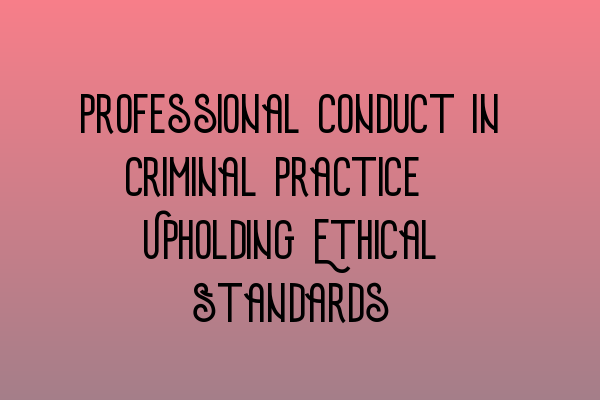Professional Conduct in Criminal Practice: Upholding Ethical Standards
As legal professionals working in criminal law practice, it is our duty and responsibility to adhere to the highest ethical standards. Upholding professional conduct not only ensures the integrity of our profession but also facilitates the fair and just administration of justice.
The Importance of Ethical Standards
Professional conduct is fundamental to the trust and confidence clients place in their legal representatives. It is essential for criminal lawyers to maintain the highest standards of integrity, honesty, and ethical behavior to protect their clients’ interests.
One key aspect of professional conduct is maintaining client confidentiality. This means that information shared by clients must remain confidential unless expressly authorized by the client or required by law. By safeguarding client confidentiality, criminal lawyers can foster an environment of trust, encouraging clients to disclose all relevant information and enabling the development of an effective defense strategy.
Conflict of Interest
Avoiding conflicts of interest is another crucial element of professional conduct in criminal practice. As lawyers, we must prioritize our clients’ best interests and avoid any situation where our personal or professional relationships could compromise our ability to act diligently and impartially.
It is essential to conduct thorough conflict checks before taking on a case and to immediately disclose any potential conflicts to the client. Transparency in handling conflicts helps maintain the integrity of the legal profession and ensures that clients receive unbiased advice and representation.
Adhering to Legal and Ethical Obligations
Legal professionals have an obligation to act within the boundaries of the law and uphold ethical guidelines established by professional regulatory bodies. Familiarity with the Solicitors Code of Conduct, Bar Standards, and the SRA Handbook is essential to ensure compliance with professional standards.
In addition, ongoing professional development and staying updated with changes in legislation and case law are critical for criminal lawyers to provide the highest level of representation to their clients. Continual learning and development help lawyers adapt to the evolving legal landscape and enhance their problem-solving skills.
Professionalism inside and outside the Courtroom
Professional conduct extends beyond the courtroom. It encompasses interactions with clients, colleagues, court personnel, and the wider community. Demonstrating respect, courtesy, and professionalism in all interactions is essential.
Building professional relationships with prosecutors, probation officers, and other professionals involved in the criminal justice system fosters effective communication and collaboration. This, in turn, improves the overall quality of representation and facilitates positive outcomes for clients.
Conclusion
Upholding ethical standards in criminal practice is paramount in fostering trust, protecting client interests, and maintaining the integrity of the legal profession. By adhering to professional conduct guidelines, criminal lawyers can ensure that justice is served and contribute to a fair and equitable criminal justice system.
For further information related to the SQE, please check out these articles:
